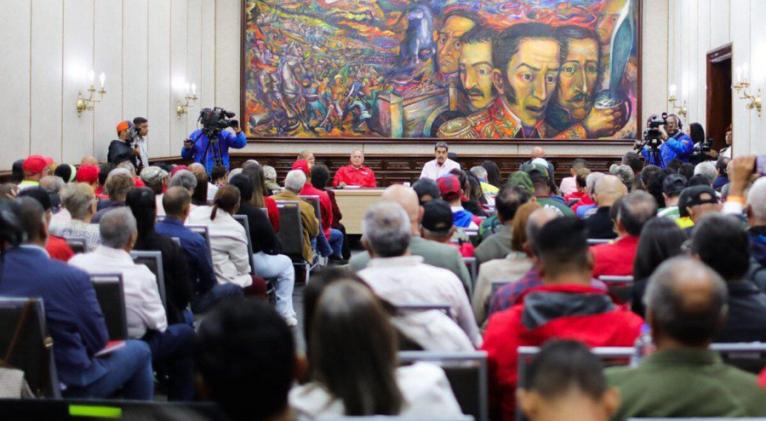Venezuela Prepares for the ‘Five Revolutionary Generations’ Congress
especiales

Popular Assemblies are discussing the development policy’s seven major objectives, Planning Minister Menendez said.
In an interview given on the Global Contact program on Monday, Venezuelan Planning Minister Ricardo Menendez spoke about the new advances in deepening the participatory democracy that the Bolivarian revolution is carrying out.
RELATED:
Venezuela Issues Arrest Warrant Against Javier Milei
“This is happening despite the fact that, in this historical juncture, a sector of the opposition associated with the U.S. imperialism has tried to keep us anchored in the past,” he said, emphasizing that these far-right forces fail to appreciate “all the damage and violence they have generated through attempts to incite civil war, sanctions, and economic blockades.”
In response to this situation, President Nicolas Maduro has instructed his cabinet not only to address the problems caused by imperialist aggressions but also to focus on central issues to maintain the country’s long-term development.
“The president has asked us to turn the page and focus on essential issues to meet the population’s needs and to develop new forms and new methods of governance,” Menendez said.
“In all the communities and communal circuits across Venezuelan territory, we are conducting a very deep debate on everyday life issues and discussing our concrete action agendas. We will take that debate to the state level and subsequently to the central level,” he added.
“In those spaces, we are discussing the seven major transformations that were presented in the elections on July 28 and that will guide us until the year 2031,” the planning minister specified, referring to the strategic public policy objectives proposed by President Maduro for his next term in office.
In his interview with teleSUR, Menendez recalled that the seven transformations that will consolidate Venezuela’s prosperity are outlined as follows:
1. Economy: This transformation aims to modernize production methods and techniques to achieve economic diversification, aligned with the new export model.
2. Full Independence: This goal expands the Bolivarian doctrine in its political, scientific, cultural, educational, and technological dimensions in the face of threats against Venezuela.
3. Peace, Security, and Territorial Integrity: It focuses on perfecting the model of citizen coexistence, ensuring justice, human rights, and defending social and territorial peace. It also includes the safeguarding and development of the Guayana Esequiba region.
4. Social: This transformation accelerates the recovery of the welfare state, the Missions, and the Great Missions in a strategy that simultaneously strengthens socialist values.
5. Politics: It advances in consolidating direct democracy with republican ethics through a profound process of repoliticization.
6. Ecology: This policy goal aims to add actions to combat the climate crisis, promote awareness, and protect the people from environmental impact, as well as safeguard the Amazon and natural reserves from the greed of capitalism.
7. Venezuela’s Insertion and Leadership in the New World Configuration: This transformation seeks the reconstruction of Latin American and Caribbean integration, strengthening BRICS, and advancing strategic alliances with emerging countries to contribute to the birth of a multipolar and multicentric world.
All these seven major policy objectives are framed within a transformation of Venezuelan governance, which involves a political revolution.
“The people are the protagonists of the entire comprehensive transformation of the State,” Menendez said, emphasizing that this leading democracy is accompanied by processes of social oversight, the fight against corruption, and the modernization of the State.
“The people are the protagonists of the entire comprehensive transformation of the State,” Menendez said, emphasizing that this leading democracy is accompanied by processes of social oversight, the fight against corruption, and the modernization of the State.
“In our direct democracy, the people are not consulted every five or six years. Our model is based on the participation of the people in all forms of government. That is the element that is often not understood in other countries where the people are simply an ornament of political discourse and not the protagonist of the political processes of the nation,” he pointed out.
This entire process of building participatory democracy involves the use of technology to “keep a record in real time of the decisions that are made in the popular assemblies and to follow them up,” the Minister of Planning said, specifying that all this is accompanied by adequate indicator systems.













Add new comment